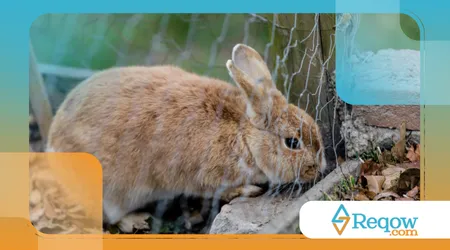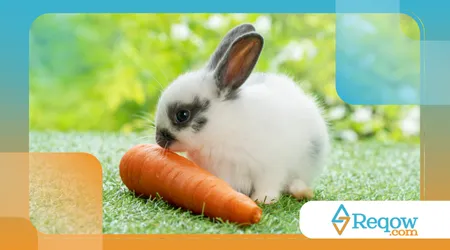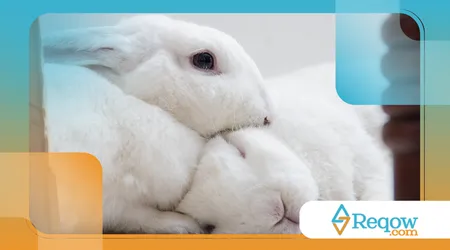My rabbit is very quiet: what could indicate a lack of essential care?

Your rabbit is very quiet, and this observation may sound an alarm for any attentive owner. Small mammals like rabbits are known for their curiosity and energy.
Advertisements
A drastic change in behavior, especially excessive stillness, often signals that something is not right in the realm of health or well-being. Don't underestimate this sign.
What could the rabbit's stillness indicate?
A rabbit's stillness isn't just a characteristic; it's an important indicator. It could be pain, stress, or even a serious gastrointestinal problem.
Ignoring these signs can compromise your pet's health and quality of life, as rabbits are prey animals and tend to hide discomfort.
One rabbit is very quiet is, in essence, communication. He can't speak, so his body language becomes his voice.
Advertisements
Careful observation and swift action are crucial. Your furry friend's well-being depends on your awareness.
Additional warning signs that accompany stillness
In addition to inactivity, look for changes in appetite and water consumption. Refusal to eat, even your favorite treats, is a worrying sign.
Smaller, altered, or absent stools also require urgent attention.
Watery eyes or nasal discharge are other indicators. Difficulty breathing, even if subtle, requires intervention. Teeth grinding, on the other hand, can be a sign of severe pain.
Any change in the way your rabbit moves is worth observing. If he shrinks, adopts a hunched posture, or limps, something is wrong.
Read more: What to do if your dog refuses to drink water during intense heat?
Rough or patchy fur are also indicative. Excessive hair loss, outside of seasonal shedding, suggests underlying problems.
The lack of play and exploration of the environment is notable. A happy rabbit interacts, sniffs, and explores its space.
Atypical vocalizations, such as grunting or squealing, may indicate pain. Rabbits rarely vocalize, so these sounds are alarming.

Common Causes for a Listless Rabbit
One of the most prevalent causes is gastrointestinal (GI) stasis, a slowing or stopping of digestion.
This is an emergency and requires immediate veterinary attention. An inadequate diet, low in fiber, is a risk factor.
Dental problems can also lead to inactivity. Overgrown teeth or sharp edges can cause pain when chewing, preventing the rabbit from eating.
Bacterial or viral infections weaken the animal. These infections can affect multiple body systems, causing lethargy.
Find out more: Pets and Vet Visits: How to Prepare Your Pet and Reduce Stress
Internal and external parasites also affect health. Fleas, mites, and worms can weaken and cause significant discomfort.
Physical injuries, often unnoticeable, cause pain. A sprain, fracture, or bruise can leave you listless and immobile.
Environmental stress is also a factor. Sudden changes, loud noises, or nearby predators can drastically affect their behavior.
Table: Possible causes and symptoms related to stillness in rabbits
| Potential Cause | Additional Symptoms (besides quietness) | Urgency |
| Gastrointestinal Stasis | Loss of appetite, small/absent stools, bloating | Emergency |
| Dental Problems | Excessive salivation, weight loss, refusal to eat | High |
| Infections | Fever, nasal/eye discharge, difficulty breathing | High |
| Parasites | Itching, hair loss, skin sores, emaciation | Average |
| Physical Injuries | Lameness, pain to the touch, abnormal posture | High |
| Stress | Hiding, aggression, tremors | Average |
Essential care to prevent apathy
A diet rich in good quality hay is essential.
It should account for 80% of the diet, ensuring the proper functioning of the digestive system. Fresh, dark vegetables complement the diet.
Provide plenty of fresh, clean water. Hydration is vital for overall health and intestinal transit. Check the waterer daily.
Provide a safe and enriched environment. Space to run, tunnels, and toys stimulate the mind and body. This prevents boredom and stress.
Regular housing hygiene prevents disease. Daily cage cleaning and bedding changes minimize the spread of bacteria.
Proper rabbit handling minimizes stress. Hold your rabbit firmly and gently, avoiding sudden movements that could startle your rabbit.
Make regular veterinary visits, at least annually, for checkups. The veterinarian can identify problems early.
The statistics are clear: more than 70% of health problems in rabbits are related to inadequate diet, according to data from House Rabbit Society 2023.
This highlights the importance of proper nutrition. It's like a car that needs the right fuel to run well; if you put sand in the tank, don't expect it to run.

When to seek professional help immediately?
If your rabbit is very quiet If your pet exhibits any of the additional symptoms mentioned, such as loss of appetite or loose stools, consult a veterinarian specializing in exotic animals. Promptness is crucial.
Don't hesitate to seek help if the behavior persists for more than a few hours. Rabbits can deteriorate quickly. Time is crucial in recovery.
++ After all, does a healthy pet need supplements? When yes, when no
One rabbit is very quiet It's an emergency. Don't wait to see if he gets better on his own. He might be suffering.
Think of a rabbit's stillness as a fire alarm system. If the alarm goes off, you don't wait for the smell of smoke to act, right? You act immediately.
Practical examples of situations and resolutions
Maria noticed that her rabbit, Pompom, a Dutch dwarf, was listless and hadn't eaten hay in 12 hours. His stools were smaller and darker.
She immediately called the exotics vet. The diagnosis was gastrointestinal stasis.
With medication and fluid therapy, Pompom recovered within 48 hours. Maria's speed was crucial.
João noticed that his rabbit, Floquinho, a lionhead, was secluded in a corner of the cage, refusing to play.
He also noticed that Floquinho was grinding his teeth slightly. When he took him to the vet, it was discovered that Floquinho had sharp points on his molars, causing pain when chewing.
The vet performed the tooth removal, and Floquinho was active and happy again. João's careful observation saved the rabbit from prolonged pain.
The importance of observation and preventive care
A rabbit's stillness is a warning sign that requires quick attention and action.
By understanding the possible causes and recognizing additional signs, you can intervene early and ensure your friend's well-being.
Preventive health, focused on diet and the environment, minimizes risks.
If your rabbit is very quiet, remember that every moment counts. A guardian's responsibility is to act diligently. We're talking about the life of a sentient being.
And finally, what is more valuable: a little concern and a visit to the vet, or the silent pain of a companion who depends completely on you?
Frequently Asked Questions
1. My rabbit is very quiet, but keeps eating. Should I be worried?
Yes. Even if he's still eating, stillness is a warning sign. It could indicate mild discomfort or the beginning of a problem. Observe him closely, and if it persists, seek veterinary advice.
2. How long can I wait before taking my rabbit to the vet if he is quiet?
In general, no more than 6 to 8 hours, especially if there are other symptoms such as loss of appetite or absence of feces. Rabbits deteriorate rapidly, and time is critical in many conditions.
3. Can I give my rabbit something if he is lethargic?
Never medicate your rabbit without veterinary guidance. Human or other animal medications can be toxic to rabbits.
Seek professional help for proper diagnosis and treatment.
4. How can I prevent my rabbit from becoming quiet due to health problems?
Maintain a diet rich in hay, provide fresh water, a clean and safe environment, and have annual veterinary visits.
Environmental enrichment and careful management are also essential.
5. Does stillness always indicate something serious?
Not always, but in most cases, it indicates some type of discomfort or health problem.
Rabbits are masters at hiding illness. It's always best to err on the side of caution and seek professional evaluation.
++ Know how to identify an emergency situation in your rabbit
